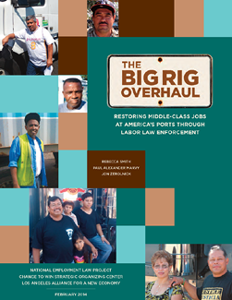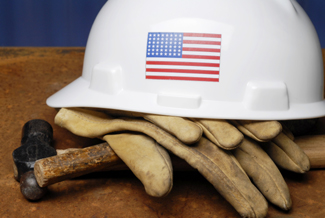Ports Primer: 6.1 Local Economy and Jobs
The port sector contributes significantly to the local economy in communities where ports are located. Contributions include:
- Employment opportunities at the port
- Employment opportunities in port-related sectors (e.g. the rail and trucking industries)
- Increased tax base for the local and state government
At some ports, workers are members of labor unions![]() labor unionAn organization of workers formed to serve members’ collective interests with regard to wages and working conditions. that advocate on their behalf and may establish terms related to hiring, wages and advancement.
labor unionAn organization of workers formed to serve members’ collective interests with regard to wages and working conditions. that advocate on their behalf and may establish terms related to hiring, wages and advancement.
There are jobs in the industry that include responsibilities for worker safety. For more information: OSHA Maritime Industry
Cargo Handling Employment Opportunities
Cargo![]() CargoThe freight (goods, products) carried by a ship, barge, train, truck or plane.-handling jobs are often the first thing that comes to mind when thinking of employment opportunities at ports. A few of the jobs related to cargo-handling are listed below:1
CargoThe freight (goods, products) carried by a ship, barge, train, truck or plane.-handling jobs are often the first thing that comes to mind when thinking of employment opportunities at ports. A few of the jobs related to cargo-handling are listed below:1
- Clerks
 ClerksWhen cargo is unloaded from a ship, a clerk checks the actual count of the goods versus the amount listed on the ship’s manifest. The clerk will note shortages, overages or damage. This is used to make claims if needed. check the actual count of the goods versus the amount listed on the ship’s manifest when cargo is unloaded from a ship. The clerk will note shortages, overages or damage.
ClerksWhen cargo is unloaded from a ship, a clerk checks the actual count of the goods versus the amount listed on the ship’s manifest. The clerk will note shortages, overages or damage. This is used to make claims if needed. check the actual count of the goods versus the amount listed on the ship’s manifest when cargo is unloaded from a ship. The clerk will note shortages, overages or damage. - Longshoremen
 LongshoremenDock workers who load and unload ships or perform administrative tasks associated with the loading or unloading of cargo. They may or may not be members of labor unions. Longshore “gangs” are hired by stevedoring firms to work the ships. Longshoremen are also called stevedores. (also called stevedores
LongshoremenDock workers who load and unload ships or perform administrative tasks associated with the loading or unloading of cargo. They may or may not be members of labor unions. Longshore “gangs” are hired by stevedoring firms to work the ships. Longshoremen are also called stevedores. (also called stevedores stevedoresLabor management companies that provide equipment and hire workers to transfer cargo between ships and docks. Stevedore companies may also serve as terminal operators. The laborers hired by the stevedoring firms are called stevedores or longshoremen.) load and unload ships or perform administrative tasks associated with the loading or unloading of cargo. Longshore “gangs” are hired by stevedoring firms and may or may not be labor union members.
stevedoresLabor management companies that provide equipment and hire workers to transfer cargo between ships and docks. Stevedore companies may also serve as terminal operators. The laborers hired by the stevedoring firms are called stevedores or longshoremen.) load and unload ships or perform administrative tasks associated with the loading or unloading of cargo. Longshore “gangs” are hired by stevedoring firms and may or may not be labor union members. - Hostlers (or hustlers)
 Hostler (or hustler)An employee who drives a tractor for the purpose of moving cargo within a container yard. drive tractors for moving cargo within a container
Hostler (or hustler)An employee who drives a tractor for the purpose of moving cargo within a container yard. drive tractors for moving cargo within a container containerA box made of aluminum, steel or fiberglass used to transport cargo by ship, rail, truck or barge. Common dimensions are 20' x 8' x 8' (called a TEU or twenty-foot equivalent unit) or 40' x 8' x 8' (called an FEU or forty-foot equivalent unit). yard.
containerA box made of aluminum, steel or fiberglass used to transport cargo by ship, rail, truck or barge. Common dimensions are 20' x 8' x 8' (called a TEU or twenty-foot equivalent unit) or 40' x 8' x 8' (called an FEU or forty-foot equivalent unit). yard. - Consolidators
 ConsolidatorThe person or firm that consolidates (combines) cargo from a number of shippers into a container that will deliver the goods to several buyers. combine cargo from a number of shippers into a container that will deliver the goods to several buyers.
ConsolidatorThe person or firm that consolidates (combines) cargo from a number of shippers into a container that will deliver the goods to several buyers. combine cargo from a number of shippers into a container that will deliver the goods to several buyers.
Additional Port-Related Employment Opportunities
Ports also offer jobs in many areas beyond cargo-handling, including:
- Terminal
 TerminalA designated area of a port used for the transmission, care and convenience of cargo and/or passengers in the interchange of them between land and water carriers or between two water carriers. It includes wharves, warehouses, covered and/or open storage spaces, cold storage plants, grain elevators and/or bulk cargo loading and/or unloading structures, landings, and receiving stations. and harbor operations
TerminalA designated area of a port used for the transmission, care and convenience of cargo and/or passengers in the interchange of them between land and water carriers or between two water carriers. It includes wharves, warehouses, covered and/or open storage spaces, cold storage plants, grain elevators and/or bulk cargo loading and/or unloading structures, landings, and receiving stations. and harbor operations - Engineering, planning and design
- Environmental management and technology
- Public, media and/or community relations
- Security and emergency management
- Worker safety - OSHA - Maritime Industry
Furthermore, ports indirectly support the creation of jobs in port-related sectors such as transportation, distribution and supply chain management. For example, truck![]() trucksHeavy automotive vehicles used to transport cargo. In the maritime industry, cargo is often carried by tractor-trailers. The tractor is the front part of the vehicle, also called a cab. The trailer is the detachable wheeled chassis behind the tractor, on which containers or other cargoes are placed. drivers who service port facilities play a vital role in moving goods from containers coming into the port to interim locations or to their final destinations.
trucksHeavy automotive vehicles used to transport cargo. In the maritime industry, cargo is often carried by tractor-trailers. The tractor is the front part of the vehicle, also called a cab. The trailer is the detachable wheeled chassis behind the tractor, on which containers or other cargoes are placed. drivers who service port facilities play a vital role in moving goods from containers coming into the port to interim locations or to their final destinations.
Worker Classifications
 Whether a worker is classified as an employee or an independent contractor can have a significant impact on the quality of working conditions, compensation and labor protections. According to the 2014 report The Big Rig Overhaul: Restoring Middle-Class Jobs at America’s Ports through Labor Law Enforcement, 49,000 of the nation’s 75,000 port truck drivers are misclassified as independent contractors.2 The report explores the implications of misclassification and addresses questions about fair pay, workers compensation and federal tax payment.
Whether a worker is classified as an employee or an independent contractor can have a significant impact on the quality of working conditions, compensation and labor protections. According to the 2014 report The Big Rig Overhaul: Restoring Middle-Class Jobs at America’s Ports through Labor Law Enforcement, 49,000 of the nation’s 75,000 port truck drivers are misclassified as independent contractors.2 The report explores the implications of misclassification and addresses questions about fair pay, workers compensation and federal tax payment.
For more information: The Big Rig Overhaul (PDF) (49 pp, 2.7 MB, About PDF) Exit
Labor Unions, Workers and Ports
 Many ports have labor unions that negotiate on behalf of members for better wages and working conditions. These unions can have powerful voices in port decision-making processes. During negotiations, they can employ tactics such as strikes or other job actions, which can significantly impact port operations.
Many ports have labor unions that negotiate on behalf of members for better wages and working conditions. These unions can have powerful voices in port decision-making processes. During negotiations, they can employ tactics such as strikes or other job actions, which can significantly impact port operations.
Maritime![]() MaritimeLocated on or near the sea. Commerce or navigation by sea. The maritime industry includes people working for transportation (ship, rail, truck and towboat/barge) companies, freight forwarders and customs brokers; stevedoring companies; labor unions; chandlers; warehouses; ship building and repair firms; importers/exporters; pilot associations, etc. labor agreements (especially when disputes arise) between unions, shipping lines, and terminal operators can greatly influence numerous issues impacting workers, nearby communities, and business owners and consumers nationwide, such as:
MaritimeLocated on or near the sea. Commerce or navigation by sea. The maritime industry includes people working for transportation (ship, rail, truck and towboat/barge) companies, freight forwarders and customs brokers; stevedoring companies; labor unions; chandlers; warehouses; ship building and repair firms; importers/exporters; pilot associations, etc. labor agreements (especially when disputes arise) between unions, shipping lines, and terminal operators can greatly influence numerous issues impacting workers, nearby communities, and business owners and consumers nationwide, such as:
Recent union concerns have included:3
- Loss of jobs due to port automation
- Introduction of private, intermodal
 intermodalUsed to indicate movements of cargo containers interchangeably between transport modes – i.e. motor, water and air carriers – and where the equipment is compatible within multiple systems. For example, boxes of hot sauce from Louisiana are stuffed into metal boxes called containers at the factory. That container is put onto a truck chassis (or a railroad flat car) and moved to a port. There the container is lifted off the vehicle and lifted onto a ship. At the receiving port, the process is reversed. Intermodal transportation uses few laborers and speeds up the delivery time. equipment owners that may employ non-union labor
intermodalUsed to indicate movements of cargo containers interchangeably between transport modes – i.e. motor, water and air carriers – and where the equipment is compatible within multiple systems. For example, boxes of hot sauce from Louisiana are stuffed into metal boxes called containers at the factory. That container is put onto a truck chassis (or a railroad flat car) and moved to a port. There the container is lifted off the vehicle and lifted onto a ship. At the receiving port, the process is reversed. Intermodal transportation uses few laborers and speeds up the delivery time. equipment owners that may employ non-union labor - Safety concerns associated with terminal modernization
The Impact of Port Labor/Management Disputes on Port-Related Jobs
 Dynamics between labor unions and port authorities are not isolated. Their complex dynamics can easily have a broad ripple effect and impact workers and businesses in port-related sectors. In severe instances, the impact can extend beyond the immediately affected region.
Dynamics between labor unions and port authorities are not isolated. Their complex dynamics can easily have a broad ripple effect and impact workers and businesses in port-related sectors. In severe instances, the impact can extend beyond the immediately affected region.
For example, port truck drivers who operate as independent contractors are paid based on each run they make and are responsible for the maintenance and operating expenses of their trucks. When shipments and loading/unloading of vessel![]() vesselA ship or large boat.s slow down significantly due to labor disputes, these truck drivers don’t get paid. In addition, the resulting congestion at ports adversely impacts near-port communities and businesses.
vesselA ship or large boat.s slow down significantly due to labor disputes, these truck drivers don’t get paid. In addition, the resulting congestion at ports adversely impacts near-port communities and businesses.











